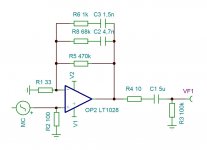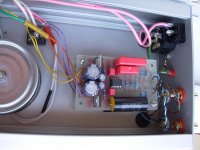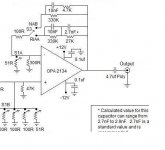G'day all, over the years I have built or bought quite a few solid state/op amp based MM phono stages that all work well although they all sound a little different.
This might be due to slight differences in the RIAA eq and there may be other reasons too. The popular one op amp full feedback design is potentially a good one however some designs of this type that I've built have sounded great, and others a bit 'ordinary'.
Recently I built a stripped down (moving magnet cartridges only) version of this design Op-amp Based RIAA Phono Preamp for MM and MC Phono Cartridges and it sounds tremendous, much better than its circuit suggests and I wonder why?
Looking at the components in the feedback loop there are many possibilities that will provide accurate RIAA eq but the one used in this circuit sounds great, for some reason. In fact my Shure M97xE (with its OEM stylus) sounds particularly nice with this phono stage which hasn't always been the case with other similarly designed phono stages, even with optimum capacitance loading of that cartridge.
Again, looking at the circuit, nothing really stands out, but for whatever reason it does sound great! Any thoughts or comments? Regards, Felix.
This might be due to slight differences in the RIAA eq and there may be other reasons too. The popular one op amp full feedback design is potentially a good one however some designs of this type that I've built have sounded great, and others a bit 'ordinary'.
Recently I built a stripped down (moving magnet cartridges only) version of this design Op-amp Based RIAA Phono Preamp for MM and MC Phono Cartridges and it sounds tremendous, much better than its circuit suggests and I wonder why?
Looking at the components in the feedback loop there are many possibilities that will provide accurate RIAA eq but the one used in this circuit sounds great, for some reason. In fact my Shure M97xE (with its OEM stylus) sounds particularly nice with this phono stage which hasn't always been the case with other similarly designed phono stages, even with optimum capacitance loading of that cartridge.
Again, looking at the circuit, nothing really stands out, but for whatever reason it does sound great! Any thoughts or comments? Regards, Felix.
I doubt deviations from the RIAA response account for any major sonic differences tbh, at least not in the sense that you mean.
I suspect its more a classic case of "the whole being more than the sum of its parts", possibly the FET opamp (which is highly regarded for audio) sounds particularly pleasing used at such high gain and where its distortion profile may change somewhat.
Only detailed measurement with the right gear would show if that was a possible reason though.
I suspect its more a classic case of "the whole being more than the sum of its parts", possibly the FET opamp (which is highly regarded for audio) sounds particularly pleasing used at such high gain and where its distortion profile may change somewhat.
Only detailed measurement with the right gear would show if that was a possible reason though.
G'day all. Mooly: thanks for that. I suspect that 'interesting' and possibly unexpected things happen in the feedback loop of the op amp!
The OPA2134 'sound' is something that I've often umed and ared about. I personally can hear and like the sound of the OPA2134, yet I've read so much on the 'net that considers the whole subject of op amp sound a myth.
I honestly suspect that op amp sound is real, but cannot be 'measured' accurately easily, and possibly is dependent on other factors as you inferred.
For what it's worth I've used many different dual op amps like the TL072, LM833, NE5532 and other dual op amps with good results, however I 'think' that I hear the OPA2134 as the nicest sounding. Even the manufacturer implies this, but offers absolutely no evidence to support it. Regards, Felix.
The OPA2134 'sound' is something that I've often umed and ared about. I personally can hear and like the sound of the OPA2134, yet I've read so much on the 'net that considers the whole subject of op amp sound a myth.
I honestly suspect that op amp sound is real, but cannot be 'measured' accurately easily, and possibly is dependent on other factors as you inferred.
For what it's worth I've used many different dual op amps like the TL072, LM833, NE5532 and other dual op amps with good results, however I 'think' that I hear the OPA2134 as the nicest sounding. Even the manufacturer implies this, but offers absolutely no evidence to support it. Regards, Felix.
Last edited:
Its no myth, opamps do sound different, even when used correctly.
Sometimes those difference are subtle and you have to listen for extended periods, days rather than hours. Its then that you start thinking, yes I really like this, or you are constantly aware that "something" isn't right for your ears. You have to trust what you hear, not what others tell you is correct or better.
I agree the 2134 is good, although for line stages I've come to consistently prefer the LM4562 over everything else. The OPA2604 is worth a listen too.
Sometimes those difference are subtle and you have to listen for extended periods, days rather than hours. Its then that you start thinking, yes I really like this, or you are constantly aware that "something" isn't right for your ears. You have to trust what you hear, not what others tell you is correct or better.
I agree the 2134 is good, although for line stages I've come to consistently prefer the LM4562 over everything else. The OPA2604 is worth a listen too.
This might interest you,
http://www.diyaudio.com/forums/analog-line-level/196461-different-opamp-compensation-technique.html
http://www.diyaudio.com/forums/analog-line-level/196461-different-opamp-compensation-technique.html
G'day mate, very interesting and yes I'm now using LM4562's in my DIY phono stage (ESP P06), and yes it is very low noise. Previously I used OPA2134's in my P06 and found them to be noticeably noisy (hissy), yet in the one op amp phono stage I linked to and built, one op amp is delivering around 40 db of voltage yet is surprisingly quiet.
The 'impedance' of the feedback loop must be important and probably depends on the op amp used in the circuit. Regards, Felix.
The 'impedance' of the feedback loop must be important and probably depends on the op amp used in the circuit. Regards, Felix.
I'm not sure that they are designed for audio. .
So what!
Opamps designed for audio are nonsense..
Its no myth, opamps do sound different, even when used correctly.
If used correctly, no, they don't. The key is "used correctly."
To wit:
- A single opamp RIAA is a difficult proposition since the gain requirements greatly reduce the available feedback. This can affect the frequency response and distortion, and greatly change the distortion profile with frequency.
- The tradeoffs between noise and RIAA feedback value scale is a critical one- lowering the RIAA network impedance decreases the noise, but loads the output stage more heavily, NOT a trivial consideration!
- CMR varies with frequency and between opamp types; in phono stages, where small signals are being send over a couple of meters of wire between two boxes, CM noise is almost inevitable. The imbalance between legs in a conventional topology guarantees that the circuit's CMR will be wretched. In a well-designed circuit, the opamp's CMR will be preserved, but that's sadly rare.
Single opamp circuits are fine for absolute-cheapest needs, but for a diyer, the extra cost associated with implementing a good design (a couple of dollars) should not be a consideration.
G'day mate, what you say sounds totally correct to me and that's why I was so surprised at the excellent sound quality of this simple one op amp phono stage given the circuit simplicity and past experience with this kind of circuit. Would you consider the feedback network in this circuit high or low impedance?
Interestingly enough the quietest MM phono stage I have is (believe it or not) the budget transistor based TCC TC-750 with battery power supply and a couple of very simple circuit modifications. Regards, Felix.
Interestingly enough the quietest MM phono stage I have is (believe it or not) the budget transistor based TCC TC-750 with battery power supply and a couple of very simple circuit modifications. Regards, Felix.
For MM, it's low, for MC, it's high (from a noise standpoint). From a drive standpoint, it's too low either way.
It's difficult (and I would say nearly impossible) to make a stage that's optimized for both. A cheap stage can do well, but there are inevitably performance compromises. Putting a couple more dollars into this design and optimizing it for one type of cartridge or the other can pay great performance dividends.
It's difficult (and I would say nearly impossible) to make a stage that's optimized for both. A cheap stage can do well, but there are inevitably performance compromises. Putting a couple more dollars into this design and optimizing it for one type of cartridge or the other can pay great performance dividends.
If used correctly, no, they don't. The key is "used correctly."
I can't agree with that, not in my experience (which has been in line level stages), although that's not to say that I've wanted them to. The differences are there, sometimes very subtle, and often only apparent over time.
It can be used for NAB too
Hi, When I cooked up the project it was to satisfy a temporary need. But it has turned out better than expected. Yes it is running close to the max GBWP for LOMC cartridges, but apparently the 2134 is sufficient to avoid funky behavior. I found that if you change the values in the feed back loop a bit it will run fine as a reel to reel tape head playback....at least in my AKAI. It is far quieter as well. See the partial schematic attached. A easy and useful project. BTW if you put a second stage 2134 with a gain of 3 on the back of it with a volume control in between it makes a rather good head phone amp and can be used with many different phones.
Hi, When I cooked up the project it was to satisfy a temporary need. But it has turned out better than expected. Yes it is running close to the max GBWP for LOMC cartridges, but apparently the 2134 is sufficient to avoid funky behavior. I found that if you change the values in the feed back loop a bit it will run fine as a reel to reel tape head playback....at least in my AKAI. It is far quieter as well. See the partial schematic attached. A easy and useful project. BTW if you put a second stage 2134 with a gain of 3 on the back of it with a volume control in between it makes a rather good head phone amp and can be used with many different phones.
Attachments
Try biasing opamp in class A, it should sound better...
Or add a lot more decoupling for a similar improvement. Both methods reduce the output stage switching noise transferred to the supply rails.
<edit> Linked to on another thread this NJM opamp might be suitable for an economy MM phono pre as its OPS is already classA and its input stage is lower noise than the NE5532 - http://www.njr.com/semicon/PDF/NJM2122_E.pdf. Seeing as the OPS bias current is only around 1mA the impedance of the feedback network needs watching carefully but perhaps an external (pull-up) current source could be added.
Last edited:
G'day all, interesting on 'decoupling'. When I first built the project, it oscillated furiously!
I eventually realised that I hadn't installed any supply bypass capacitors. With those installed (.1 uf monolithic ceramics), all instability/oscillation instantly and magically disappeared! Regards, Felix.
I eventually realised that I hadn't installed any supply bypass capacitors. With those installed (.1 uf monolithic ceramics), all instability/oscillation instantly and magically disappeared! Regards, Felix.
A problem with single stage phono pre is sensitivity to transient overload caused by dust grains on the vinyl.
Multi stage phono pres can be quite insensitive to this and output a barely audible crackle.
Ime, single stage phono pres can exaggerate dust clicks and pops badly/loudly.
Dan.
Multi stage phono pres can be quite insensitive to this and output a barely audible crackle.
Ime, single stage phono pres can exaggerate dust clicks and pops badly/loudly.
Dan.
- Status
- This old topic is closed. If you want to reopen this topic, contact a moderator using the "Report Post" button.
- Home
- Source & Line
- Analogue Source
- Thoughts on the sound quality of one op amp full feedback phono stages.


